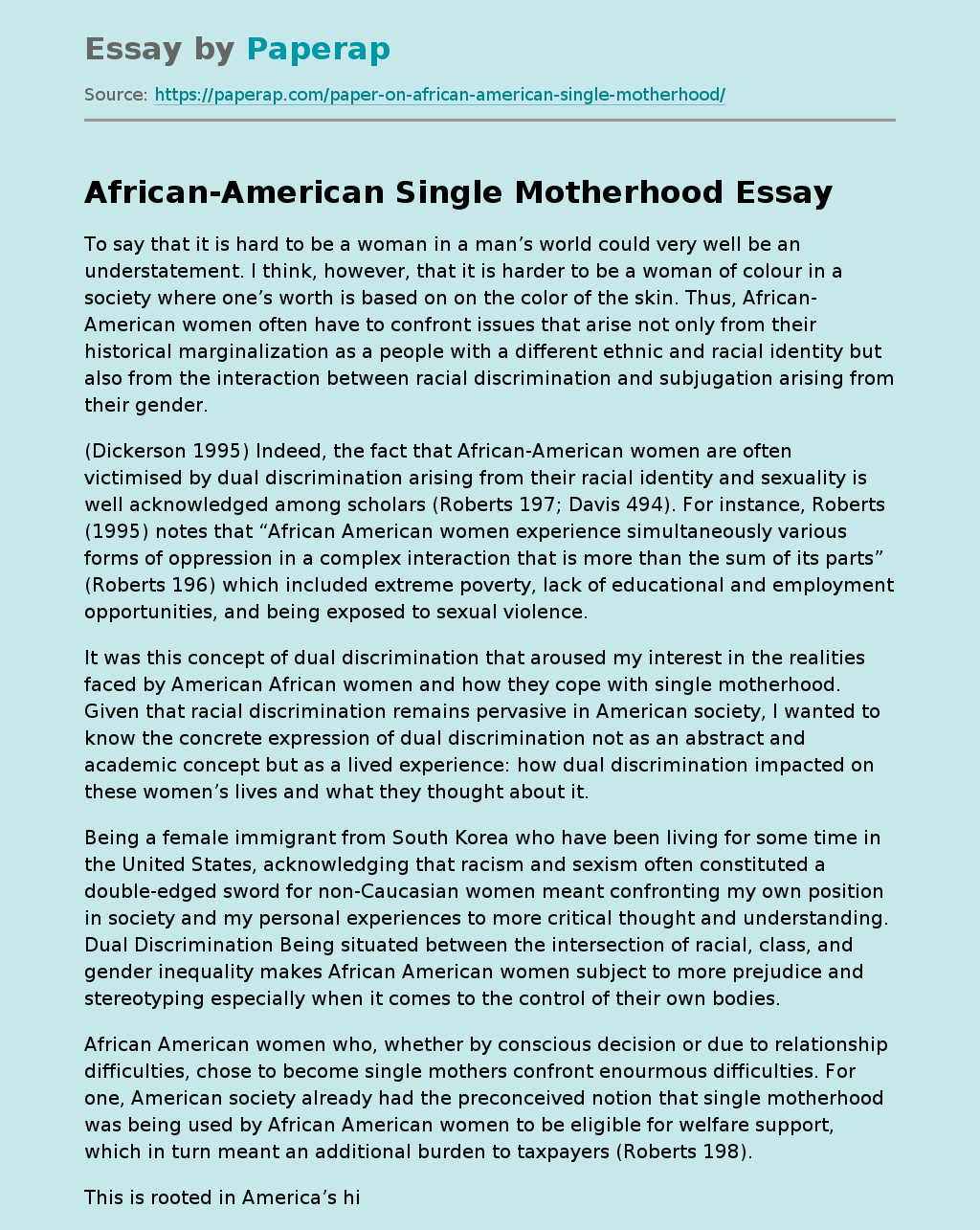African-American Single Motherhood
To say that it is hard to be a woman in a man’s world could very well be an understatement. I think, however, that it is harder to be a woman of colour in a society where one’s worth is based on on the color of the skin. Thus, African-American women often have to confront issues that arise not only from their historical marginalization as a people with a different ethnic and racial identity but also from the interaction between racial discrimination and subjugation arising from their gender.
Indeed, the fact that African-American women are often victimised by dual discrimination arising from their racial identity and sexuality is well acknowledged among scholars.
For instance, Roberts (1995) notes that “African American women experience simultaneously various forms of oppression in a complex interaction that is more than the sum of its parts” which included extreme poverty, lack of educational and employment opportunities, and being exposed to sexual violence. It was this concept of dual discrimination that aroused my interest in the realities faced by American African women and how they cope with single motherhood.
Given that racial discrimination remains pervasive in American society, I wanted to know the concrete expression of dual discrimination not as an abstract and academic concept but as a lived experience: how dual discrimination impacted on these women’s lives and what they thought about it.
Being a female immigrant from South Korea who have been living for some time in the United States, acknowledging that racism and sexism often constituted a double-edged sword for non-Caucasian women meant confronting my own position in society and my personal experiences to more critical thought and understanding.
Dual Discrimination Being situated between the intersection of racial, class, and gender inequality makes African American women subject to more prejudice and stereotyping especially when it comes to the control of their own bodies.
African American women who, whether by conscious decision or due to relationship difficulties, chose to become single mothers confront enourmous difficulties. For one, American society already had the preconceived notion that single motherhood was being used by African American women to be eligible for welfare support, which in turn meant an additional burden to taxpayers. This is rooted in America’s historical treatment of the African American people as slaves, wherein the White plantation owners’ control extended to the women’s bodies, often subjecting women to sexual exploitation and making them bear the reproductive burdens of carrying illegitimate children. Therefore instead of ameliorating women from impoverishment to help them in the responsibility of raising their children, society often treated these women with contempt.
Unfortunately, such stereotypes persist in supposedly modern times in as much as racism is rooted systematically in American society. Boyd (1993) laments that as African American women, “we’re expected not to deviate from the mold of how we are supposed to be as Black women. It’s expected that our loyalty to our race must and should override our loyalty to our individuality as women, as if we could automatically separate the two intertwining segments of our lives. ” Such stereotypes about African American single mothers compound not only the difficulties faced by these women.
Even when these women are clearly trying their best to financially provide for their families, they are not immune to the “curse” of being born coloured and female. Reid (2002), in her study about why African American women often had higher employment exits, reports that “employers held stereotypes that associated black women with single motherhood” and that these employers commonly “associated Black women with a negative image of the single mother who is routinely tardy or absent.
This is in contrast to the account of an African American single mother on the internet who reported that she juggled two jobs in order to keep her family afloat In the same manner, African American single motherhood has often been examined by scholars in an often condescending manner, associating their choice to the increase in societal problems such as drug addiction and violent attitude among African American children who they feel are products of “broken families. ” An African American single mother therefore complains in an internet forum that “by society standards, because I am African American, single mother with these four kids I should be off somewhere smoking crack, on walfare, my boys should be gang bangers somewhere, my daughter should already be working on her 2nd child and we should all be living “in da hood” on Section 8, right? ”
African-American Single Motherhood. (2017, May 18). Retrieved from https://paperap.com/paper-on-african-american-single-motherhood/

